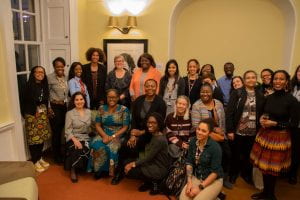This year’s International Women’s Day (IWD) celebrations at the University have been bigger and better than ever. I’m incredibly grateful to staff and students who’ve shared their personal experiences at IWD events across campus this week – your stories have been an inspiration to us all.

As a University, we’ve been working hard to improve gender equality. The University Strategy sets out an ambitious commitment to eradicate the gender pay gap in the professoriate, and we also set a target of increasing the percentage of female professors to 33 per cent by 2023. Since announcing these commitments in 2016 we’ve made real progress, with new initiatives to support women’s career development and a new academic promotions framework. We are on track to meet our 2023 targets. Our latest organisational Gender Pay Gap has reduced by 2.5% since 2017 and I’m particularly proud that we are the first UK University to issue a landmark Collective Agreement outlining the next key actions which will be taken to address the academic gender pay gap. All of our work in this area has earned us a shortlisting for the Guardian University Awards in the Staff Experience category.
The senior team is determined to address all areas of inequality across our University and create a level playing field for everybody, regardless of race, ethnicity, gender identity or cultural background. Acknowledging there is a problem is an important first step. We must also listen to and learn from fellow colleagues.
It was my pleasure this week to host Professor Olivette Otele and Dr Jane Khawaja for an International Women’s Day celebration of BAME women in Royal Fort House.
Both Olivette and Jane shared candid accounts of their lives and career progression to date. At times deeply poignant, with grace and good humour both women talked of the highs and lows (including racism and other forms of prejudice) they’ve experienced as BAME women pursuing a career in academia.
The need for perseverance was a common theme for overcoming the challenges they faced, as was the importance of celebrating and reflecting on success. However, both women were clear they would not have achieved their success without the support of a close network of family, friends, colleagues and (crucially) mentors.
With this in mind, I would encourage eligible colleagues to sign-up to our Bristol Women’s Mentoring Network. Here, female staff at grades K, L and M can receive mentoring support, advice and guidance from female colleagues in senior roles. It’s been wonderful to see the network already making a real difference to the progression of our female staff and I was particularly pleased that Professor Esther Crawley won South West Public Sector Mentor of the Year for her participation in the scheme. I look forward to seeing it continue to develop.
While we are making progress to tackle gender and racial inequality at Bristol, as a leadership team we recognise there’s still a long way to go. That’s why we’re examining our recruitment practices, our institutional cultures and our reward and recognition systems. We’ll also shortly be publishing our first-ever ethnicity pay gap report alongside our statutory gender pay gap report. While this isn’t yet required by law, we believe it’s the right thing to do to and it will help us understand and address the challenge head-on.
I’m confident that together we can bring an end to both gender and racial inequality at Bristol and I hope this year’s IWD provided an opportunity to both reflect on and celebrate all the incredible women in our university community – it certainly has for me.
